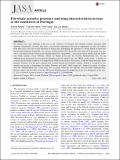Fin whale acoustic presence and song characteristics in seas to the southwest of Portugal
Abstract
Fin whales were once abundant in the seas to the southwest of Portugal, but whaling activities decreased their numbers considerably. Acoustic data from ocean bottom seismometers provide an opportunity to detect fin whales from their notes, data that would otherwise be logistically challenging and expensive to obtain. Based on inter-note interval and frequency bandwidth, two acoustic patterns produced by fin whales were detected in the study area: pattern 1, described from fin whales in the Mediterranean Sea, and pattern 2, associated with fin whales from the northeast North Atlantic Ocean (NENA). NENA fin whales travel into the western Mediterranean Sea, but the Mediterranean population has not been documented to travel regularly into the NENA. In this study, 11 months of acoustic data recorded southwest of Portugal in the NENA were used to characterize 20-Hz fin whale notes into these patterns. Pattern 2 was the most common and occurred mostly in November-January. Pattern 1 occurred less frequently and mostly in September-December, February and April, which suggested a limited excursion of whales from the Mediterranean Sea. There were also occasions when the two patterns were recorded simultaneously. Results suggest that fin whales from the NENA and Mediterranean Sea might mix in the area during part of the year.
Citation
Pereira , A , Harris , D , Tyack , P & Matias , L 2020 , ' Fin whale acoustic presence and song characteristics in seas to the southwest of Portugal ' , Journal of the Acoustical Society of America , vol. 147 , no. 4 , pp. 2235-2249 . https://doi.org/10.1121/10.0001066
Publication
Journal of the Acoustical Society of America
Status
Peer reviewed
ISSN
0001-4966Type
Journal article
Description
Funding: D.H. was funded by the Office of Naval Research (ONR; Award No. N00014-14-1-0394). P.T. acknowledges funding from ONR Award No. N00014-15-1-2553 and the MASTS pooling initiative (The Marine Alliance for Science and Technology for Scotland). MASTS is funded by the Scottish Funding Council (Grant Reference HR09011) and contributinginstitutions.Collections
Items in the St Andrews Research Repository are protected by copyright, with all rights reserved, unless otherwise indicated.

